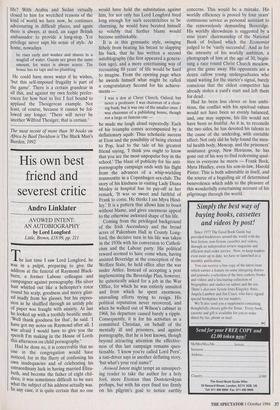His own best friend and severest critic
Andro Linklater
AVOWED INTENT: AN AUTOBIOGRAPHY by Lord Longford Little, Brown, £18.99, pp. 211 he last time I saw Lord Longford, he was in a pulpit, preparing to give the address at the funeral of Raymond Black- burn, a former Labour colleague and campaigner against pornography. His silver hair whirled out like a helicopter's rotor round his scalp, goodness and mercy glint- ed madly from his glasses, but his expres- sion as he shuffled through an untidy pile of paper was fraught with anxiety. At last he looked up with a toothily beatific smile. `Well thank goodness for that', he said. 'I have got my notes on Raymond after all. I was afraid I would have to give you the speech I'm making in the House of Lords this afternoon on child pornography.' Had he done so, it is conceivable that no one in the congregation would have noticed, for in the flurry of confessing his own inadequacies and of celebrating his extraordinary luck in having married Eliza- beth, and become the father of eight chil- dren, it was sometimes difficult to be sure What the subject of his address actually was. In any case, it is quite certain that no one would have held the substitution against him, for not only has Lord Longford lived long enough for such eccentricities to be charming, he would have berated himself so volubly that further blame would become unthinkable.
It is in this gymnastic style, swinging lithely from beating his breast to slapping his back, that he has written a second autobiography (the first appeared a genera- tion ago), and a more entertaining way of recounting 88 years' of life would be hard to imagine. From the opening page when he awards himself what might be called a congratulatory Second for his achieve- ments - I was a don at Christ Church, Oxford, but never a professor. I was chairman of a clear- ing bank, but it was one of the smaller ones. I was chairman of a publishing house, though not a large or famous one - he made me laugh aloud repeatedly. Each of his triumphs comes accompanied by a deflationary squib. Thus scholastic success at Eton and the possibility of being elected to Pop, lead to the tale of his greatest friend saying, 'I think you ought to know that you are the most unpopular boy in the school.' The blaze of publicity for his anti- pornography campaign ends with his flight from the advances of a whip-wielding transvestite in a Copenhagen sex-club. The story of his kindness in visiting Lady Diana Mosley in hospital has its pay-off in her remark, 'It was so sweet and faithful of Frank to come. He thinks I am Myra Hind- ley.' It is a pattern that allows him to boast without blame, and gives enormous appeal to the otherwise awkward shape of his life.
Coming from the privileged background of the Irish Ascendancy and the broad acres of Pakenham Hall in County Long- ford, the decisive turn in his life was taken in the 1930s with his conversion to Catholi- cism and the Labour party. His political reward seemed to have come when, having assisted Beveridge at the conception of the Welfare State, he held office after the war under Attlee. Instead of accepting a post implementing the Beveridge Plan, however, he quixotically asked for a job in the War Office, for which he was entirely unsuited and from which he spent enormous, unavailing efforts trying to resign. His political reputation never recovered, and when he walked out of Wilson's cabinet in 1968, his departure caused barely a ripple. Consequently, it is for his activities as a committed Christian, on behalf of the mentally ill and prisoners, and against pornography, that he is best known, though beyond attracting attention the effective- ness of this last campaign remains ques- tionable. 'I know you're called Lord Porn', a taxi-driver says in another deflating story, `but what's your real name?'
Avowed Intent might tempt an unsuspect- ing reader to take the author for a holy fool, more Etonian than Dostoievskyan perhaps, but with his eyes fixed too firmly on his pilgrim's goal to notice earthly concerns. This would be a mistake. His worldly efficiency is proved by four years' continuous service as personal assistant to the remorselessly demanding Beveridge. His worldly shrewdness is suggested by a nine years' chairmanship of the National Bank of Ireland which the Economist judged to be `vastly successful'. And as for the intensity of his worldly ambition, a photograph of him at the age of 30, begin- ning a race round Christ Church meadow, gives the game away. His opponents are a dozen callow young undergraduates who stand waiting for the starter's signal, barely conscious that the oldest competitor has already stolen a yard's start and left them for dead.
Had he been less clever or less ambi- tious, the conflict with his spiritual values would not have been so evenly balanced, and, one may suppose, his life would not have been so fruitful. As it is, to reconcile the two sides, he has devoted his talents to the cause of the underdog, with enviable effect. Not only did he help found the men- tal health body, Mencap, and the prisoners' assistance group, New Horizons, he has gone out of his way to find redeeming qual- ities in everyone he meets — Frank Beck, Myra Hindley, even his son-in-law, Harold Pinter. This is both admirable in itself, and the source of a beguiling air of determined benevolence which adds to the pleasure of this wonderfully entertaining account of his pilgrimage through the world.


























































 Previous page
Previous page